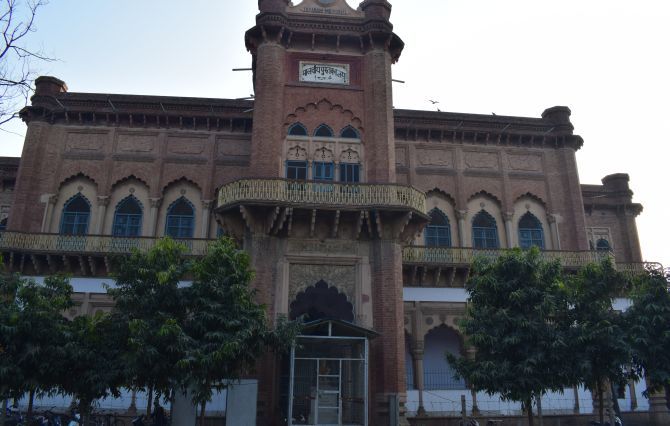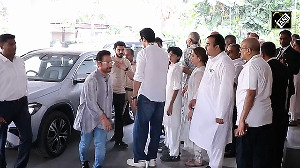The government's negligence towards this 'treasure house of knowledge' can be seen from the fact that monkeys roam about freely in the reading rooms, disturbing the calm of the library, as well as putting the lives of the readers in danger, writes Sajad Ahmad Dar.

As the train passes from Aligarh toward Delhi, on the left, across the Railway Road of Aligarh, one witnesses a high, fort-like structure.
It is a public library, named after Pandit Madan Mohan Malaviya (1861-1946). It once instituted a 'News Club' and even subscribed to the Morning Post of London to satisfy the inquisitiveness of the readers for news of the Russo-Japanese war (1905). But it now fails to provide even the very basic facilities to its readers.
The Pustakalaya (library), which is a two-storeyed building, currently houses about 70,000 books in different languages, viz, Hindi, Urdu, English and Sanskrit, with the Hindi material outnumbering the others.
The late 19th century North-Western Provinces (as Uttar Pradesh was then known) witnessed a mushrooming of educational institutions.
In Aligarh, the Mohammadan Anglo Oriental (M A O) College (later upgraded to the Aligarh Muslim University) was established in 1877.
Around the same time various socio-religious-political associations sprang up on religious-revivalist lines. These organisations were more powerful in the Hindi belt.
Richard Gordon (1975) would argue that prominent associations like Arya Samaj and Sanathan Dharm Sabhas promoted Hindi and the Devnagari script and organised gau rakshini sabhas.
A similar kind of an association was founded in Aligarh. This was the 'Bharatvarshiya National Association', one of the oldest educational societies of Aligarh.
It was founded in 1878 by a group of public-spirited citizens in order to promote education and Hindi (Devnagari) language in this town of the province.
For the promotion of Hindi language the association also formed a Hindi sub-committee, 'Bhasha Sambhardhani Sabha'.
Its president was Raja Laxman Singh, the then deputy collector. Babu Tota Ram Verma, the founder-secretary, Rai Laxmi Narain, Munshi Nawal Kishore Bhargava, Raja Bahadur and Raja Jai Kishan Das Pathak were some of the notable members of this association.
In 1882 the association first planned to run a public library for the benefit of the people of Aligarh in general and students in particular.
It was resolved that the library be named after Sir Alfered Lyall, the then lieutenant governor of the province, who readily extended his patronage to the association.
The premises where the library is situated now was once a part of the Aligarh Telegraph Office.
Due to the efforts of Sir Lyall, the government agreed to grant this spacious plot of land to the association for the construction of the public library, with a condition that it should be completed by 1902.
However, overcoming numerous hurdles, the library was completed in 1904, incurring a cost of Rs 8 lakh.
Munshi Nawal Kishore Bhargava, and his son Prag Narain Bhargava, made one-third of the contributions, besides making a free gift of all their publications and prints at their Nawal Kishore Press.
Babu Tota Ram also enriched the library by donating his entire valuable personal collection.
Kishan Deb Bahadur, the great magnate of Calcutta, also gifted the (subscription of) the then popular daily The Nation of Calcutta to the library. Interestingly, he got himself enrolled as the first life member of the association.
'Malviya Pustakalaya', the name which the library now bears, was given to it in 1947, on the recommendation of the executive committee of the association, to commemorate Mahamana Pandit Madan Mohan Malviya's efforts for the promotion of Hindi and Nagri script vis-à-vis Urdu in Aligarh, besides 'acknowledging his unique services in the cause of education at Benaras' (Varanasi).
Not only this, the members of Bharatvarshiya National Association also installed a bust of Pandit Malviya in the middle of the library lawns, and whose unveiling ceremony was performed by Pandit Hirdaya Nath Kunzru (1887-1978), one of the closest associates of Malviya.
Totaram, who arguably is one of the best known lawyers Aligarh ever produced, left his job in Varanasi, came back to Aligarh, and fought for the cause of promotion of Hindi vis-à-vis Urdu in the courts and kutcherries of Aligarh.
It was he who invited Malviya to Aligarh for instilling enthusiasm among the members.
The campaign to collect the signatures of some 60,000 people became a success only due to the painstaking efforts of this duo.
It was later submitted to the then governor of Aligarh, Anthony MacDonnell. Their efforts bore fruit when on August 15, 1900, the British government agreed to promote Hindi.
Despite such illustrious history behind it, the glorious library is now in a filthy and pathetic condition. It has almost fallen into ruins.
Due to constraints of space, a good number of students are forced to sit on the lawns and in the dirty corridors where there is no provision of chairs.
There are six reading rooms in the library, out of which one is reserved for girls.
While the office of the library and the girls' reading room remain open from 9 am to 5 pm, the reading rooms for boys remain open till 8 pm.
Some basic amenities like washrooms, drinking water, and fans are just not to be found in the library. Heating arrangements during winters, too, are absent.
Though the students are required to deposit a registration fee of Rs 180 per annum, yet the library functionaries deny them access to most of the books.
The authorities claim that usually the issued books never return, an accusation the readers and students vehemently deny.
Some students of science and medical sciences even complained about unavailability of books relevant to their subjects.
There is also an issue of inadequate grants-in-aid from the state government.
A laughably insufficient grant of Rs 5,000 per annum is provided to the library, which can't even meet out the salaries of its seven employees for a month.
The library is run by a committee of 70-75 members who predominantly come from the Kayastha caste (the caste to which Babu Totaram belonged), besides the trading communities of Aggarwals, and a few from the Varsheney caste.
B S Kamtaniya, a lawyer by profession, is the president of the Bharatvarshiya National Association which looks after at the library. About 50 shops fall in the premises of the library; rent obtained from them is the only major source of income for the historic public library.
The government's negligence towards this 'treasure house of knowledge' can be seen from the fact that monkeys roam about freely in the reading rooms, disturbing the calm of the library, as well as putting the lives of the readers in danger.
In contrast, the conditions are far better in the libraries of the two colleges in the city, Dharm Samaj College (founded in 1947) and Varsheney College, located at a distance of less than half a kilometer from this library.
Is it because the colleges provide better economic returns to the Aggarwals and Varsheneys, who manage these institutions, that the community -- and the government -- provides sufficient funds to them?
It is time for the affluent and politically influential communities of this urban locale to pay attention to this historic Pustakalaya, which is crying out to be salvaged.
Sajad Ahmad Dar is pursuing doctoral research on the urban history of Aligarh in the 20th century, at the Centre of Advanced Study in History, Aligarh Muslim University.











 © 2025
© 2025